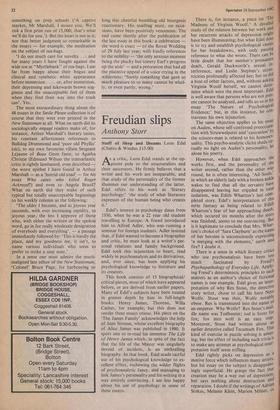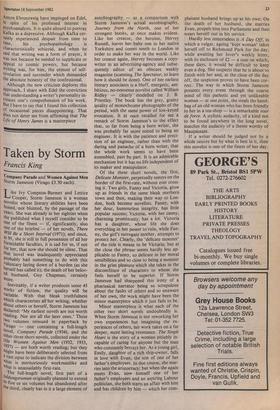Freudian slips
Anthony Storr
Stuff of Sleep and Dreams Leon Edel (Chatto & Windus £15.00)
AA s a critic, Leon Edel stands at the op- .i.posite pole to the structuralists and their successors. He firmly believes that a writer and his work are inseparable, and that study of the personality of the former illumines our understanding of the latter. Edel refers to his work as 'literary psychology;' the study of what literature expresses of the human being who creates it.'
Edel's interest in psychology dates from 1930, when he was a 22 year old student travelling in Europe. A friend introduced him to Alfred Adler, who was running a seminar for foreign students. Adler insisted that, if Edel wanted to become a biographer and critic, he must look at a writer's per- sonal relations and family background. Edel took this injunction to heart, read widely in psychoanalysis and its derivatives, and, ever since, has been applying his psychological knowledge to literature and its creators.
This book consists of 15 biographical/ critical pieces, most of which have appeared before, or are derived from earlier papers. Many of Edel's subjects have been treated in greater depth by him in full-length books: Henry James, Thoreau, Willa Cather, for example; but this does not render these essays otiose. His piece on the 'The James Family' acknowledges the.help of Jean Strouse, whose excellent biography of Alice James was published in 1980. It spurs one to re-read his immense The Life of Henry James which, in spite of the fact that the life of the Master was singularly devoid of incident, is an enthralling biography. In that book, Edel made tactful use of his psychological knowledge to ex- cellent effect, eschewing the wilder flights of psychoanalytic fancy, and managing to link James's personality and his writing in a way entirely convincing. I am less happy about his use of psychology in some of these essays. There is, for instance, a piece on 'The Madness of Virginia Woolf.' A detailed study of the relation between her work and her recurrent attacks of depression might have been illuminating; but what Edel does is to try and establish psychological causes for her breakdowns, with only passing reference to what she wrote. There can be little doubt that her mother's premature death, Gerald Duckworth's sexual la' terference, and Leslie Stephen's eccen- tricities profoundly affected her; but so did a host of other factors, and, without asking Virginia Woolf herself, we cannot deter- mine which were the most important. Edel is well aware that persons who are not pres- ent cannot be analysed, and tells us so in his essay 'The Nature of Psychological Evidence;' but, in this instance, he con- travenes his own injunction. The same objection applies to his essay on Auden, whose self-confessed preoccupa- tion with Struwwelpeter and 'castration' by the scissors-man is related to his homosex- uality. This psycho-analytic cliche sheds vir- tually no light on Auden's personality, let alone his poetry.
However, when Edel approaches the works first, and the personality of the writer second, rather than the other way round, he is often interesting. 'All Souls, in which an elderly lady with a broken ankle wakes to find that all the servants have disappeared leaving her crippled in total isolation, was Edith Wharton's last com- pleted story. Edel's interpretation of this eerie fantasy as being related to Edith Wharton's fear of her approaching death, which occured six months after the story was finished, seems to me convincing. But is it legitimate to conclude that Mrs. Whar- ton's choice of 'Sara Clayburn' as the name of her heroine is unconsciously expressing 'a merging with the elements,' earth and fire? I doubt it.
There is a sense in which literary critics who use psychoanalysis have been too much fascinated by Freud's
Psychopathology of Everyday Life. Apply- ing Pl;- ing Freud's deterministic principles to such matters as an author's choice of fictional names is one example. Edel gives an inter- pretation of why Rex Stout, the detective story writer, chose to call his hero Nero Wolfe. Stout was thin, Wolfe notably obese. Rex is transmuted into the name of an emperor. Why Wolfe? Rex Stout's mid- dle name was Todhunter; tod is Scots for fox; fox into wolf is an easy step* Moreover, Stout had written about all earlier detective called Tecumseh Fox. This kind of exercise in puzzle solving is amus- ing; but the effect of including such trivia is to make any attempt at psychological inter- pretation itself seem trifling. Edel rightly picks on depression as a motive force which influences many artists, but his essay on the subject is disappoint- ingly superficial.. He grasps the fact that creation may be a way out of depression, but says nothing about destruction and reparation. I doubt if the writings of Adrian Stokes, Melanie Klein, Marion Milner, or
Anton Ehrenzweig have impinged on Edel, in spite of his professed interest in Psychoanalysis. It is quite absurd to portray Kafka as a depressive. Although Kafka cer- tainly experienced despair from time to time, his psychopathology is characteristically schizoid, and when he said that writing was a form of prayer, it was not because he needed to supplicate or appeal to cosmic powers, but because writing was, for him, the utmost of self- revelation and surrender which demanded the absolute honesty of the confessional.
Although the new criticism deplores this approach, I share with Edel the conviction that understanding a writer's personality in- creases one's comprehension of his work. But I have to say that I found this collection of occasional pieces disappointing. That does not deter me from affirming that The Life of Henry James is a masterpiece



































 Previous page
Previous page